精校版北京英语高考试题文档版含答案.doc
(精校版)2022年新高考全国Ⅰ卷英语高考真题文档版(原卷)(含答案)
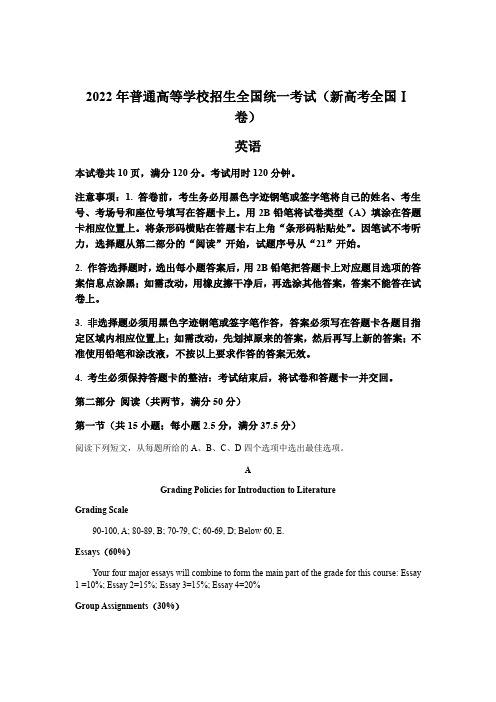
2022年普通高等学校招生全国统一考试(新高考全国Ⅰ卷)英语本试卷共10页,满分120分。
考试用时120分钟。
注意事项:1. 答卷前,考生务必用黑色字迹钢笔或签字笔将自己的姓名、考生号、考场号和座位号填写在答题卡上。
用2B铅笔将试卷类型(A)填涂在答题卡相应位置上。
将条形码横贴在答题卡右上角“条形码粘贴处”。
因笔试不考听力,选择题从第二部分的“阅读”开始,试题序号从“21”开始。
2. 作答选择题时,选出每小题答案后,用2B铅笔把答题卡上对应题目选项的答案信息点涂黑;如需改动,用橡皮擦干净后,再选涂其他答案,答案不能答在试卷上。
3. 非选择题必须用黑色字迹钢笔或签字笔作答,答案必须写在答题卡各题目指定区域内相应位置上;如需改动,先划掉原来的答案,然后再写上新的答案;不准使用铅笔和涂改液,不按以上要求作答的答案无效。
4. 考生必须保持答题卡的整洁:考试结束后,将试卷和答题卡一并交回。
第二部分阅读(共两节,满分50分)第一节(共15小题;每小题2.5分,满分37.5分)阅读下列短文,从每题所给的A、B、C、D四个选项中选出最佳选项。
AGrading Policies for Introduction to LiteratureGrading Scale90-100, A; 80-89, B; 70-79, C; 60-69, D; Below 60, E.Essays(60%)Your four major essays will combine to form the main part of the grade for this course: Essay 1 =10%; Essay 2=15%; Essay 3=15%; Essay 4=20%Group Assignments(30%)Students will work in groups to complete four assignments(作业)during the course. All the assignments will be submitted by the assigned date through Blackboard, our online learning and course management system.Daily Work/In-Class Writings and Tests/Group Work/Homework(10%)Class activities will vary from day to day, but students must be ready to complete short in-class writings or tests drawn directly from assigned readings or notes from the previous class' lecture/discussion, so it is important to take careful notes during class. Additionally, from time to time I will assign group work to be completed in class or short assignments to be completed at home, both of which will be graded.Late WorkAn essay not submitted in class on the due date will lose a letter grade for each class period it is late. If it is not turned in by the 4th day after the due date, it will earn a zero. Daily assignments not completed during class will get a zero. Short writings missed as a result of an excused absence will be accepted.21. Where is this text probably taken from?A. A textbook.B. An exam paper.C. A course plan.D. An academic article.22. How many parts is a student's final grade made up of?A. Two.B. Three.C. Four.D. Five.23. What will happen if you submit an essay one week after the due date?A. You will receive a zero.B. You will lose a letter grade.C. You will be given a test.D. You will have to rewrite it.BLike most of us, I try to be mindful of food that goes to waste. The arugula(芝麻菜)was to make a nice green salad, rounding out a roast chicken dinner. But I ended up working late. Then friends called with a dinner invitation. I stuck the chicken in the freezer. But as days passed, the arugula went bad. Even worse, I had unthinkingly bought way too much; I could have made six salads with what I threw out.In a world where nearly 800 million people a year go hungry, "food waste goes against the moral grain," as Elizabeth Royte writes in this month's cover story. It's jaw-dropping how much perfectly good food is thrown away—from “ugly"(but quite eatable)vegetables rejected by grocers to large amounts of uneaten dishes thrown into restaurant garbage cans.Producing food that no one eats wastes the water, fuel, and other resources used to grow it. That makes food waste an environmental problem. In fact, Royte writes, "if food waste were a country, it would be the third largest producer of greenhouse gases in the world."If that's hard to understand, let's keep it as simple as the arugula at the back of my refrigerator. Mike Curtin sees my arugula story all the time —but for him, it's more like 12 bones of donated strawberries nearing their last days. Curtin is CEO of DC Central Kitchen in Washington, D.C., which recovers food and turns it into healthy meals. Last year it recovered more than 807,500 pounds of food by taking donations and collecting blemished(有瑕疵的)produce that otherwise would have rotted in fields. And the strawberries? V olunteers will wash, cut, and freeze or dry them for use in meals down the road.Such methods seem obvious, yet so often we just don't think. "Everyone can play a part in reducing waste, whether by not purchasing more food than necessary in your weekly shopping or by asking restaurants to not include the side dish you won't eat," Curtin says.24. What does the author want to show by telling the arugula story?A. We pay little attention to food waste.B. We waste food unintentionally at times.C. We waste more vegetables than meat.D. We have good reasons for wasting food.25. What is a consequence of food waste according to the text?A. Moral decline.B. Environmental harm.C. Energy shortage.D. Worldwide starvation.26. What does Curtin's company do?A. It produces kitchen equipment.B. It turns rotten arugula into clean fuel.C. It helps local farmers grow fruitsD. It makes meals out of unwanted food.27. What does Curtin suggest people do?A. Buy only what is needed.B. Reduce food consumption.C. Go shopping once a week.D. Eat in restaurants less often.CThe elderly residents(居民)in care homes in London are being given hens to look after to stop them feeling lonely.The project was dreamed up by a local charity(慈善组织)to reduce loneliness and improve elderly people's wellbeing, It is also being used to help patients suffering dementia, a serious illness of the mind. Staff in care homes have reported a reduction in the use of medicine where hens are in use.Among those taking part in the project is 80-year-old Ruth Xavier. She said: “I used to keep hens when I was younger and had to prepare their breakfast each morning before I went to school."I like the project a lot. I am down there in my wheelchair in the morning letting the hens outand down there again at night to see they've gone to bed."It's good to have a different focus. People have been bringing their children in to see the hens and residents come and sit outside to watch them. I'm enjoying the creative activities, and it feels great to have done something useful."There are now 700 elderly people looking after hens in 20 care homes in the North East, and the charity has been given financial support to roll it out countrywide.Wendy Wilson, extra care manager at 60 Penfold Street, one of the first to embark on the project, said: "Residents really welcome the idea of the project and the creative sessions. We are looking forward to the benefits and fun the project can bring to people here."Lynn Lewis, director of Notting Hill Pathways, said: "We are happy to be taking part in the project. It will really help connect our residents through a shared interest and creative activities."28. What is the purpose of the project?A. To ensure harmony in care homes.B. To provide part-time jobs for the aged.C. To raise money for medical research.D. To promote the elderly people's welfare.29. How has the project affected Ruth Xavier?A. She has learned new life skills.B. She has gained a sense of achievement.C. She has recovered her memory.D. She has developed a strong personality.30. What do the underlined words "embark on" mean in paragraph 7?A. Improve.B. Oppose.C. Begin.D. Evaluate.31. What can we learn about the project from the last two paragraphs?A. It is well received.B. It needs to be more creative.C. It is highly profitable.D. It takes ages to see the results.DHuman speech contains more than 2,000 different sounds, from the common "m" and "a" to the rare clicks of some southern African languages. But why are certain sounds more common than others? A ground-breaking, five-year study shows that diet-related changes in human bite led to new speech sounds that are now found in half the world's languages.More than 30 years ago, the scholar Charles Hockett noted that speech sounds called labiodentals, such as "f" and "v", were more common in the languages of societies that ate softer foods. Now a team of researchers led by Damián Blasi at the University of Zurich, Switzerland, has found how and why this trend arose.They discovered that the upper and lower front teeth of ancient human adults were aligned(对齐), making it hard to produce labiodentals, which are formed by touching the lower lip to the upper teeth. Later, our jaws changed to an overbite structure(结构), making it easier to produce such sounds.The team showed that this change in bite was connected with the development of agriculture in the Neolithic period. Food became easier to chew at this point. The jawbone didn't have to do as much work and so didn't grow to be so large.Analyses of a language database also confirmed that there was a global change in the sound of world languages after the Neolithic age, with the use of "f" and "v" increasing remarkably during the last few thousand years. These sounds are still not found in the languages of many hunter-gatherer people today.This research overturns the popular view that all human speech sounds were present when human beings evolved around 300,000 years ago. "The set of speech sounds we use has not necessarily remained stable since the appearance of human beings, but rather the huge variety of speech sounds that we find today is the product of a complex interplay of things like biological change and cultural evolution," said Steven Moran, a member of the research team.32. Which aspect of the human speech sound does Damián Blasi's research focus on?A. Its variety.B. Its distribution.C. Its quantity.D. Its development.33. Why was it difficult for ancient human adults to produce labiodentals?A. They had fewer upper teeth than lower teeth.B. They could not open and close their lips easily.C. Their jaws were not conveniently structured.D. Their lower front teeth were not large enough.34. What is paragraph 5 mainly about?A. Supporting evidence for the research results.B. Potential application of the research findings.C. A further explanation of the research methods.D. A reasonable doubt about the research process.35. What does Steven Moran say about the set of human speech sounds?A. It is key to effective communication.B. It contributes much to cultural diversity.C. It is a complex and dynamic system.D. It drives the evolution of human beings.第二节(共5小题;每小题2.5分,满分12.5分)阅读下面短文,从短文后的选项中选出可以填入空白处的最佳选项。
北京英语 高考试题及答案
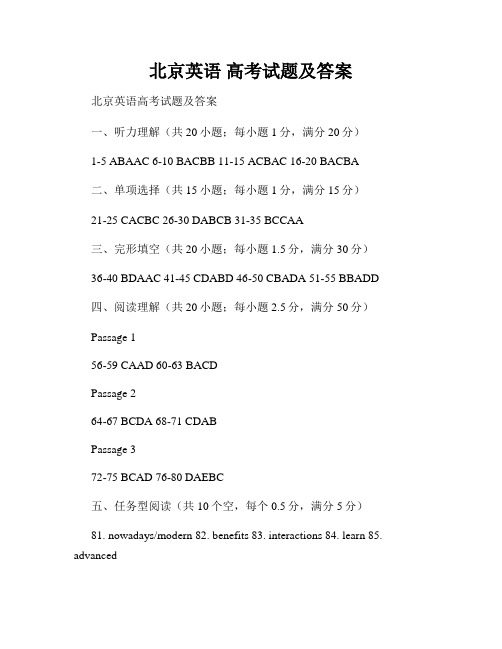
北京英语高考试题及答案北京英语高考试题及答案一、听力理解(共20小题;每小题1分,满分20分)1-5 ABAAC 6-10 BACBB 11-15 ACBAC 16-20 BACBA二、单项选择(共15小题;每小题1分,满分15分)21-25 CACBC 26-30 DABCB 31-35 BCCAA三、完形填空(共20小题;每小题1.5分,满分30分)36-40 BDAAC 41-45 CDABD 46-50 CBADA 51-55 BBADD四、阅读理解(共20小题;每小题2.5分,满分50分)Passage 156-59 CAAD 60-63 BACDPassage 264-67 BCDA 68-71 CDABPassage 372-75 BCAD 76-80 DAEBC五、任务型阅读(共10个空,每个0.5分,满分5分)81. nowadays/modern 82. benefits 83. interactions 84. learn 85. advanced六、短文改错(共10小题;每小题1分,满分10分)86. a t → on 87. asks 前加she 88. happy 后加to 89. that → when 90. is → are91. many → much 92. has → have 93. were → are 94. ourselves → us 95. who → whom七、写作(满分25分)假设你是李华,你的美国朋友Tom想了解中国高考。
请根据以下提示,给他回一封电子邮件,介绍中国高考的情况。
提示:1. 高考是中国高中毕业生进入大学的考试,被认为是人生的转折点;2. 高考科目包括语文、数学、外语等,考试时间为三天;3. 高考分数决定了大学录取的标准,竞争非常激烈;4. 高考期间,城市会采取交通限制措施,保障考试的顺利进行;5. 高考结束后,学生们会放松一下,去旅行或者参加各种活动。
北京英语高考试卷及答案
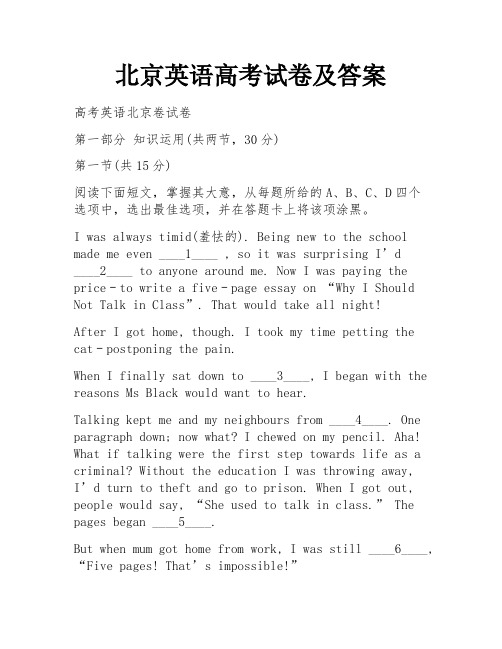
北京英语高考试卷及答案高考英语北京卷试卷第一部分知识运用(共两节,30分)第一节(共15分)阅读下面短文,掌握其大意,从每题所给的A、B、C、D四个选项中,选出最佳选项,并在答题卡上将该项涂黑。
I was always timid(羞怯的). Being new to the school made me even ____1____ , so it was surprising I’d____2____ to anyone around me. Now I was paying the price﹣to write a five﹣page essay on “Why I Should Not Talk in Class”. That would take all night!After I got home, though. I took my time petting the cat﹣postponing the pain.When I finally sat down to ____3____, I began with the reasons Ms Black would want to hear.Talking kept me and my neighbours from ____4____. One paragraph down; now what? I chewed on my pencil. Aha! What if talking were the first step towards life as a criminal? Without the education I was throwing away,I’d turn to theft and go to prison. When I got out, people would say, “She used to talk in class.” The pages began ____5____.But when mum got home from work, I was still ____6____, “Five pages! That’s impossible!”“Well, you’d better get back to work,” she said. “and I want to read it when you’re through.”Soon after dinner, I handed the essay to mum. I half expected a____7____﹣at least an “I hope you’v e learned your lesson”. ____8____, mum laughed and laughed as she read.The next day, when Ms Black read the essay to the class, everyone laughed. I could ____9____ they weren’t making fun of me: they laughed because I had the power to tell a funny story. My____10____ still needed some nudging(激发), but I did learn I wasn’t shy in print.1. A. freer B. shyer C. calmer D. happier2. A. nod B. point C. listen D. chat3. A. weep B. rest C. write D. read4. A. learning B. playing C. planning D. laughing5. A. standing out B. flying by C. breaking up D. checking in6. A. celebrating B. longing C. complaining D. warning7. A. lecture B. reason C. reward D. solution8. A. Therefore B. Moreover C. Meanwhile D. Instead9. A. hope B. imagine C. tell D. predict10. A. patience B. confidence C. tolerance D. independence第二节(共15分)A阅读下面短文,根据短文内容填空。
2021年高考真题--英语(北京卷)(Word版附解析)
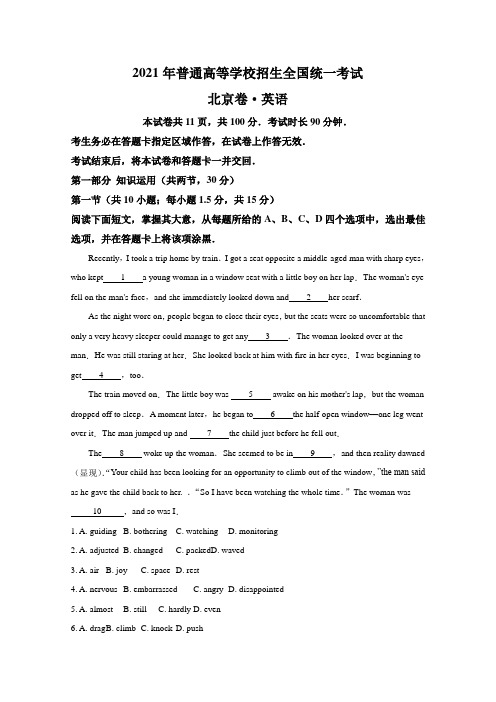
2021年普通高等学校招生全国统一考试北京卷·英语本试卷共11页,共100分.考试时长90分钟.考生务必在答题卡指定区域作答,在试卷上作答无效.考试结束后,将本试卷和答题卡一并交回.第一部分知识运用(共两节,30分)第一节(共10小题;每小题1.5分,共15分)阅读下面短文,掌握其大意,从每题所给的A、B、C、D四个选项中,选出最佳选项,并在答题卡上将该项涂黑.Recently,I took a trip home by train.I got a seat opposite a middle-aged man with sharp eyes,who kept____1____a young woman in a window seat with a little boy on her lap.The woman's eye fell on the man's face,and she immediately looked down and____2____her scarf.As the night wore on,people began to close their eyes,but the seats were so uncomfortable that only a very heavy sleeper could manage to get any____3____.The woman looked over at the man.He was still staring at her.She looked back at him with fire in her eyes.I was beginning to get____4____,too.The train moved on.The little boy was ____5____ awake on his mother's lap,but the woman dropped off to sleep.A moment later,he began to____6____the half-open window—one leg went over it.The man jumped up and ____7____the child just before he fell out.The____8____ woke up the woman.She seemed to be in____9____,and then reality dawned (显现).“Your child has been looking for an opportunity to climb out of the window,”the man said as he gave the child back to her. .“So I have been watching the whole time.”The woman was_____10_____,and so was I.1. A. guiding B. bothering C. watching D. monitoring2. A. adjusted B. changed C. packedD. waved3. A. air B. joy C. space D. rest4. A. nervous B. embarrassed C. angry D. disappointed5. A. almost B. still C. hardly D. even6. A. drag B. climb C. knock D. push7. A. grabbed B. rocked C. touched D. picked8. A. alarm B. quarrelC. risk D. noise9. A. sorrow B. relief C. panic D. pain10. A. astonished B. confused C. concerned D. inspired【答案】1. C 2. A 3. D 4. C 5. B 6. B 7. A 8. D 9. C 10. A 【分析】这是一篇记叙文。
(精校版)2020年北京卷英语高考真题文档版(答案)

2020年普通高等学校招生全国统一考试(北京卷)英语参考答案第一部分:知识运用(共两节,45分)第一节语法填空(共10小题;每小题1.5分,共15分)1. plays/has played/is playing/has been playing2. lucky3. if/whether4. are thrown5. to break6. into/to7. countries8. found9. lived/had lived/had been living 10. smarter第二节完形填空(共20小题;每小题1.5分,共30分)11. C 12. B 13. C 14. A 15. D 16. B 17. D 18. A 19. C 20. A 21. D 22. B 23. C 24. A 25. D 26. B 27. D 28. A 29. B 30. C第二部分:阅读理解(共两节,40分)第一节(共15小题;每小题2分,共30分)31. C 32. B 33. A 34. B 35. D 36. A 37. C 38. D 39. B 40. D 41. C 42. D43. A 44. B 45. A第二节(共5小题;每小题2分,共10分)46. B 47. D 48. C 49. G 50. A第三部分:书面表达(共两节,35分)第一节(15分)One possible version:Dear Jim,How are you doing? I hope everything's OK with you.Our school's drama club plans to start practising. Since you're away in Britain, we need a drama teacher to be in your place. Would you please recommend one for us?He or she should be a native English speaker, currently in Beijing, and experienced in both directing and teaching.Thank you, for your help. Please take care of yourself. Remember to wear a mask when necessary.Best wishes,Yours,Li Hua第二节(20分)一、内容要点1. 发现问题2. 征求意见3. 线上讨论4. 汇报成果二、范文One possible version:While studying at home, I surveyed my class on “self-discipline”. The findings worried me a lot.To solve the problem, I asked my parents for help, and they offered some practical advice. Then I held an online discussion with my classmates on how to well discipline ourselves. After that, we all knew better what to do.Three months later, I did a second survey, which showed great improvements in self-discipline. I phoned my teacher about it, and we both felt very pleased.。
2019年北京卷英语高考真题及答案解析(word精编)
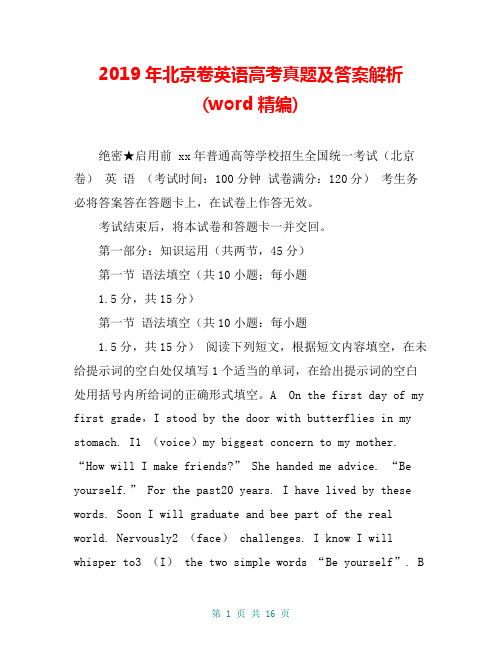
2019年北京卷英语高考真题及答案解析(word精编)绝密★启用前 xx年普通高等学校招生全国统一考试(北京卷)英语(考试时间:100分钟试卷满分:120分)考生务必将答案答在答题卡上,在试卷上作答无效。
考试结束后,将本试卷和答题卡一并交回。
第一部分:知识运用(共两节,45分)第一节语法填空(共10小题;每小题1.5分,共15分)第一节语法填空(共10小题:每小题1.5分,共15分)阅读下列短文,根据短文内容填空,在未给提示词的空白处仅填写1个适当的单词,在给出提示词的空白处用括号内所给词的正确形式填空。
A On the first day of my first grade,I stood by the door with butterflies in my stomach. I1 (voice)my biggest concern to my mother. “How will I make friends?” She handed me advice. “Be yourself.” For the past20 years. I have lived by these words. Soon I will graduate and bee part of the real world. Nervously2 (face) challenges. I know I will whisper to3 (I)the two simple words “Be yourself”. BEarth Day,4 (mark)on22 April,is an annual event aiming to raise public awareness about environmental protection. First celebrated51970,the Day now includes events in more than190 countries and regions(地区). No matter what you like to do,there is a way to get involved in various6 (activity) on Earth Day. You can plant a tree,make a meal with locally grown vegetables,or save power but according to Wilson, he benefits just as much from the29 . “I just love driving and I love these kids, “Wilson said. “It s such a(n)30 to be a part of these kids’ lives, even just for a few hours, getting to know them and hea ring their stories.“11.A. linkingB. sendingC. offeringD. distributing12.A. donatingB. lendingC. deliveringD. volunteering13.A. pavedB. coveredC. measuredD. wandered14.A. argumentsB. interviewsC. negotiationsD. wandered15.A. metB. drivenC. addressedD. conversations16.A. evenB. everC. onceD. already17.A. earnedC. assessedD. demanded18.A. transportationB. styleC. timeD. munication19.A. forcedB. awkwardC. ridiculousD. suspicious20.A. selectsB. recitesC. guessesD. remembers21.A. act onB. settle onC. check on22.A. clubB. leagueC. collegeD. programme23.A. farB. aroundC. beyondD. forwards24.A. assistB. watchC. urgeD. warm25.A. expectsB. attemptsC. managesD. hesitates26.A. extraB. unusualC. necessaryD. adequate27.A. shareB. fuelC. repairD. exchange28.A. requiredB. allowedC. remindedD. convinced29.A. experienceB. arrangementC. appreciationD. employment30.A. effortB. ambitionC. privilegeD. convenience第二部分:阅读理解(共两节,40分)第一节(共15小题;每小题2分,共30分)阅读下列短文,从每题所给的A.B.C.D四个选项中,选出最佳选项,并在答题卡上将该项涂黑。
(NEW)[答案]2019北京高考英语试题及答案解析【word精校版】
![(NEW)[答案]2019北京高考英语试题及答案解析【word精校版】](https://img.taocdn.com/s3/m/34fd9bc27c1cfad6195fa74c.png)
2019年普通高等学校招生全国统一考试(北京卷)英语语法填空1.voiced【解析:该句缺少谓语,且根据首句可知应用过去时态,故填voiced。
】2.facing【解析:该空所在处为非谓语动词用法,且根据句意可知,此处表示主动动作,故填现在分词形式。
】3.myself【解析:此处指自言自语,且空前为介词to,故填myself。
】4.marked【解析:此处是非谓语动词做定语的用法,此处指地球日被定在四月二十二日,故用过去分词形式。
】5.in【解析:空后为年份,根据句意可知此处指第一次庆祝地球日是在1970年,所以此处填in。
】6.activities【解析:空前用various修饰,且activity为可数名词,故此处用复数形式。
】7.suggests/suggested/has suggested【解析:此处没有特殊用于某种时态的时间状语,且句意并未明确指出进行调查的时间,故一般现在时、一般过去时和现在完成时均可使用。
主语是Research,故现在时态中要用单三形式。
】8.where【解析:经过分析句子成分可知,空处所引导的从句应与“What students do at college”并列,且根据空后的“they go”可以得知此处填where。
】9.who/that【解析:空后部分缺少主语,且此处为先行词是those的定语从句。
先行词为人,关系词可用who也可用that。
】10.meaningful【解析:and连接并列成分,前面为healthy,故空处也应填入形容词,故填meaningful。
】阅读理解【文章大意】本文介绍了一位心系学生的教授,无偿接送学生们,并因此成为学生们敬仰并亲近的对象。
11.C【解析:第一段提到Wilson总会风雨无阻地将家庭经济紧张的学生们送到课堂。
此空后为“free rides”,可猜测此处指Wilson是向学生们“提供”免费搭便车服务。
】12.D【解析:前文提到了“free rides”,故可知此处亦指这是Wilson免费的、自发的行为,故选D。
高考北京卷英语及参考答案解析(精选3篇)
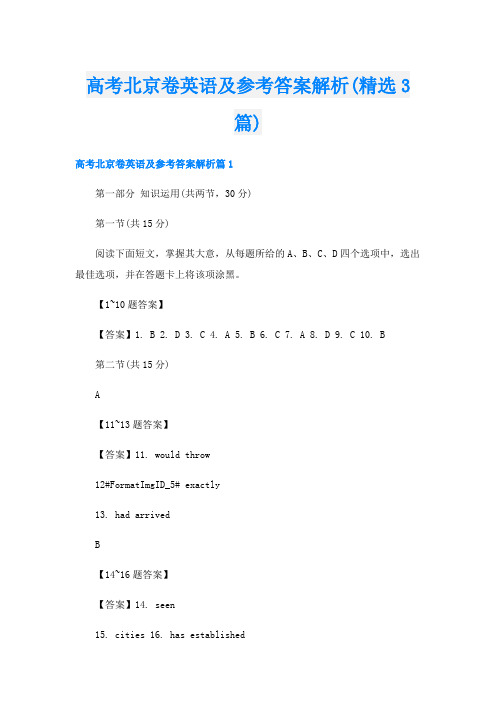
高考北京卷英语及参考答案解析(精选3篇)高考北京卷英语及参考答案解析篇1第一部分知识运用(共两节,30分)第一节(共15分)阅读下面短文,掌握其大意,从每题所给的A、B、C、D四个选项中,选出最佳选项,并在答题卡上将该项涂黑。
【1~10题答案】【答案】1. B 2. D 3. C 4. A 5. B 6. C 7. A 8. D 9. C 10. B第二节(共15分)A【11~13题答案】【答案】11. would throw12#FormatImgID_5# exactly13. had arrivedB【14~16题答案】【答案】14. seen15. cities 16. has establishedC【17~20题答案】【答案】17. to 18. where19. to address20. facing第二部分阅读理解(共两节,38分)第一节(共28分)阅读下列短文,从每题所给的A、B、C、D四个选项中,选出最佳选项,并在答题卡上将该项涂黑。
【21~23题答案】【答案】21. B 22. C 23. B【24~27题答案】【答案】24. A 25. D 26. B 27. C【28~30题答案】【答案】28. D 29. C 30. A【31~34题答案】【答案】31. A 32. C 33. B 34. D第二节(共10分)根据短文内容,从短文后的七个选项中选出能填入空白处的最佳选项,并在答题卡上将该项涂黑。
选项中有两项为多余选项。
【35~39题答案】【答案】35. D 36. F 37. G 38. B 39. C第三部分书面表达(共两节,32分)第一节(共4题;第(1)、(2)题各2分,第(3)题3分,第(4)题5分,共12分)【40~43题答案】【答案】40. Habits are built through learning and repetition.41. A routine involves repeated behaviour while a habit is a deep ﹣rooted urge.42. Picking up a new habit takes a few week, while building a healthy habit takes a shorter time. Because building a healthy habit takes many months.43. I have a good habit of going to bed early and getting up early. Therefore, I can study energetically every morning, which makes me study efficiently. Also, I am very healthy.第二节(20分)【44题答案】【答案】Dear Jim,Hearing that you are planning a club activity with the theme of “Green Beijing” and need my help, I am writing to offer you my suggestions.I think you can carry out this activity in an interactive and experiential manner, which means students can participate and have a better understanding of “Green Beijing” through getting involved in different activities by themselves. You can showcase garbageclassification on site, plant trees and publicize sharing economy, which will all fit into the theme of “Green Beijing”.Hopefully, you will get some inspiration from my suggestions. Wish you success.Yours,Li Hua高考北京卷英语及参考答案解析篇2一、高考英语听力英语听力应试技巧与策略听前:略读题目,切入话题,划出重点,预测内容(确定人物身份)听中:捕捉信息,速记要点,有的放矢,去伪存真(短文独白,首末为主旨句,注意5W,1H)听后:连贯记忆,前后联系,综合考虑,一锤定音。
- 1、下载文档前请自行甄别文档内容的完整性,平台不提供额外的编辑、内容补充、找答案等附加服务。
- 2、"仅部分预览"的文档,不可在线预览部分如存在完整性等问题,可反馈申请退款(可完整预览的文档不适用该条件!)。
- 3、如文档侵犯您的权益,请联系客服反馈,我们会尽快为您处理(人工客服工作时间:9:00-18:30)。
2018年普通高等学校招生全国统一考试英语(北京卷)(考试时间:100分钟试卷满分:120分)考生务必将答案答在答题卡上,在试卷上作答无效。
考试结束后,将本试卷和答题卡一并交回。
第一部分:知识运用(共两节,45分)第一节单项填空(共15小题;每小题1分,共15分)从每题所给的A、B、C、D四个选项中,选出可以填入空白处的最佳选项,并在答题卡上将该项涂黑。
例:I t’s so nice to hear from her again. _________, we last met more than thirty years ago.A. W hat’s moreB. That’s to sayC. In other wordsD. Believe it or not答案是D。
1. —Hi, I’m Peter. Are you new here? I haven’t seen you around?—Hello, Peter. I’m Bob. I just _________ on Monday.A. startB. have startedC. startedD. had started2. _________ we don’t stop climate change, many animals and plants in the world will be gone.A. AlthoughB. WhileC. IfD. Until3. _________ along the old Silk Road is an interesting and rewarding experienceA. TravelB. TravelingC. Having traveledD. Traveled4. Susan had quit her well-paid job and _________ as a volunteer in the neighborhood when I visited her last year.A. is workingB. was workingC. has workedD. had worked5. She and her family bicycle to work, _________ helps them keep fit.A. whichB. whoC.asD. that6. During the Mid-Autumn Festival, family members often gather together _________ a meal, admire the moon and enjoy moon cakes.A. shareB. to shareC. having sharedD. shared7. China’s high-speed railways _________ from 9,000 to 25,000 kilometers in the past few years.A. are growingB. have grownC. will growD. had grown8. In any unsafe situation, simply _________ the button and a highly-trained agent will get you the help you need.A. pressB. to pressC. pressingD. pressed9. A rescue worker risked his life saving two tourists who _________ in the mountains for two days.A. are trappingB. have been trappedC. were trappingD. had been trapped10. Ordinary soap, _________ correctly, can deal with bacteria effectively.A. usedB. to useC. usingD. use11. Without his support, we wouldn’t be _________ we are now.A. howB. whenC. whereD. why12. In today’s informatio n age, the loss of data _________ cause serious problems for a company.A. needB. shouldC. canD. must13. They might have found a better hotel if they _________ a few more kilometers.A. droveB. would driveC. were to driveD. had driven14. —Good morning, Mr. L ee’s office.—Good morning. I’d like to make an appointment _________ next Wednesday afternoon.A. forB. onC. inD. at15. This is _________ my father has taught me—to always face difficulties and hope for the best.A. howB. whichC. thatD. what第二节完形填空(共20小题;每小题1.5分,共30分)阅读下面短文,掌握其大意,从每题所给的A、B、C、D四个选项中,选出最佳选项,并在答题卡上将该项涂黑。
The Homeless HeroFor many, finding an unattended wallet filled with £400 in cash would be a source(来源)of temptation(诱惑). But the 16 would no doubt be greater if you were living on the streets with little food and money. All of this makes the actions of the homeless Tom Smith 17 more remarkable.After spotting a 18 on the front seat inside a parked car with its window down, he stood guard in the rain for about two hours waiting for the 19 to return.After hours in the cold and wet, he 20 inside and pulled the wallet out hoping to find some ID so he could contact(联系)the driver, only to 21 it contained £400 in notes, with another £50 in spare change beside it.He then took the wallet to a nearby police station after 22 a note behind to let the owner know it was safe. When the car’s owner John Anderson and his colleague Carol Lawrence returned to the car—which was itself worth £35, 000—in Glasgow city centre, they were 23 to find two policemen standing next to it. The policemen told them what Mr. Smith did and that the wallet was 24 .The pair were later able to thank Mr. Smith for his 25 .Mr. Anderson said:"I couldn’t believe that the guy never took a penny. To think he is sleeping on the streets tonight 26 he could have stolen the money and paid for a place to stay in. This guy has nothing and27 he didn’t take the wallet for himself;he thought about others 28 . I t’s unbelievable. It just proves there are 29 guys out there."Mr. S mith’s act 30 much of the public’s attention. He also won praise from social media users after Mr. Anderson 31 about the act of kindness on Facebook.Now Mr. Anderson has set up an online campaign to 32 money for Mr. Smith and other homeless people in the area, which by yesterday had received £8,000. "I think the faith that everyone has shown 33 him has touc hed him. People have been approaching him in the street; he’s ha d job 34 and all sorts,"Mr. Anderson commented.For Mr. Smith, this is a possible life-changing 35 . The story once again tells us that one good turn deserves another.16. A. hope B. aim C. urge D. effort17. A. still B. even C. ever D. once18. A. wallet B. bag C. box D. parcel19. A. partner B. colleague C. owner D. policeman20. A. turned B. hid C. stepped D. reached21. A. discover B. collect C. check D. believe22. A. taking B. leaving C. reading D. writing23. A. satisfied B. excited C. amused D. shocked24. A. safe B. missing C. found D. seen25. A. service B. support C. kindness D. encouragement26. A. when B. if C. where D. because27. A. rather B. yet C. already D. just28. A. too B. though C. again D. instead29. A. honest B. polite C. rich D. generous30. A. gave B. paid C. cast D. drew31. A. learned B. posted C. cared D. heard32. A. borrow B. raise C. save D. earn33. A. of B. at C. for D. in34. A. details B. changes C. offers D. applications35. A. lesson B. adventure C. chance D. challenge第二部分:阅读理解(共两节,40分)第一节(共15小题;每小题2分,共30分)阅读下列短文,从每题所给的A、B、C、D四个选项中,选出最佳选项,并在答题卡上将该项涂黑。
